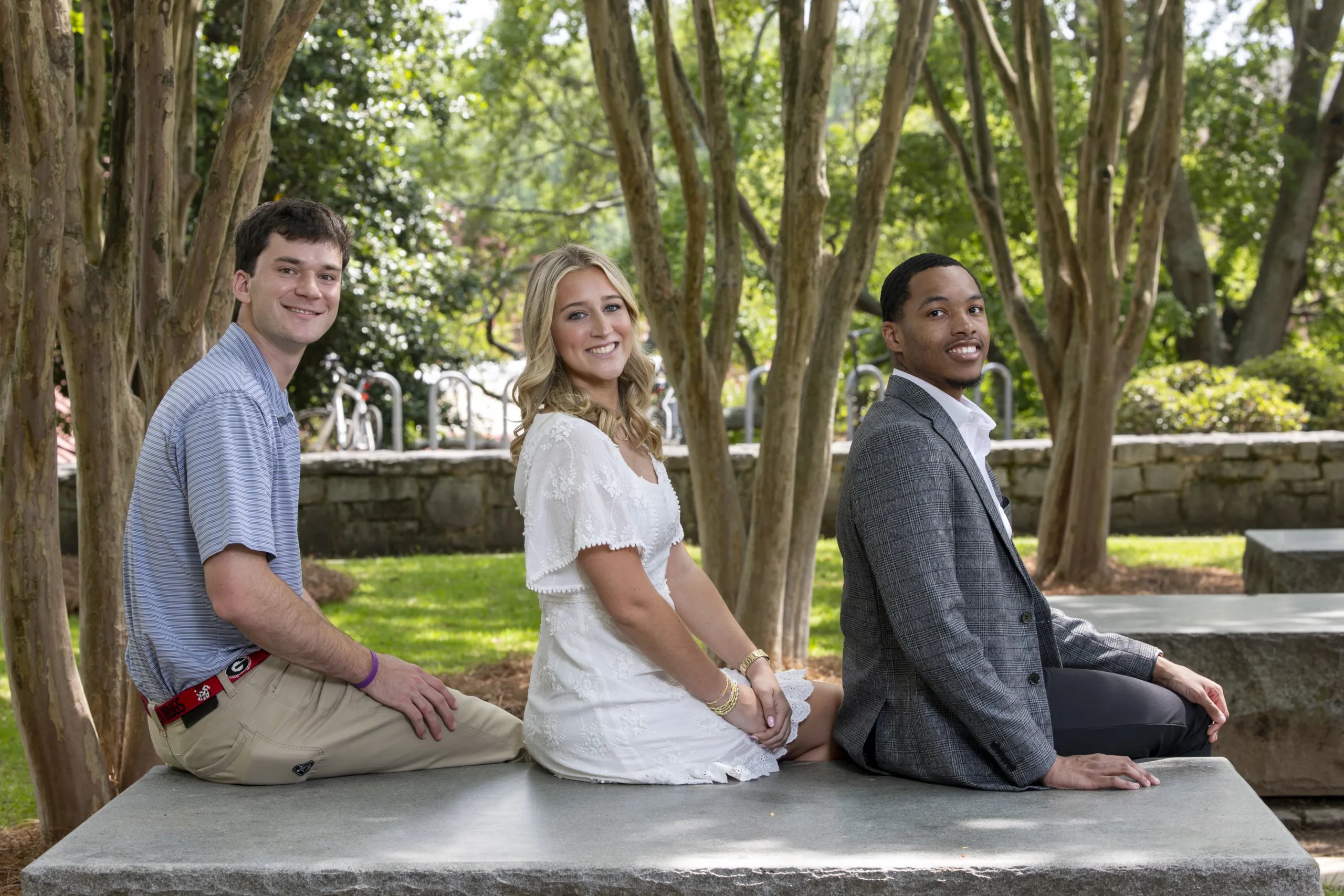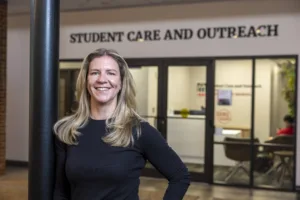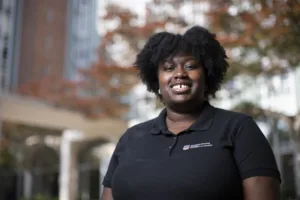A Culture of Care
UGA’s Support Dawgs program empowers campus community members to address mental health needs.

When Grady Taylor talks with fellow students about well-being resources at the University of Georgia, he doesn’t just share what’s available. He shares his story.
As a freshman, he was struggling with a course and reached out to Student Care and Outreach staff member Alicia Talbird MSW ’12. She told him about peer tutoring resources and how to take advantage of office hours. He walked away from that experience eager to learn more about the well-being resources available to students.
Now a fourth-year economics major, Taylor tells his story to peers and has found that his openness encourages them to seek support when they need it. “Resources are abundant at UGA, and someone’s door is always open if you’re willing to reach out,” he says.
Taylor is one of many UGA students, faculty, and staff who have completed the Support Dawgs certification, a three-part training program that’s transforming how the UGA community approaches mental health and well-being—not just in crises but in everyday conversations across campus.
Offered by Student Care and Outreach, part of UGA’s Well-being Resources within the Division of Student Affairs, the program trains the UGA community to identify, understand, and respond to mental health problems and crises, including anxiety disorders, trauma, and depression. It also focuses on sexual assault awareness and prevention, and in-depth coverage of the well-being resources and support offered at UGA. More than 1,230 students representing over 58 student organizations have begun the training along with nearly 500 faculty and staff.
“We usually only talk about mental health when someone’s in crisis,” says Carrie Smith PhD ’18, director of Student Care and Outreach at UGA and one of the program’s founders. “But now we’re seeing students proactively engage with resources prior to crisis.”
The shift from crisis response to proactive support reflects UGA’s broader institutional commitment to promoting well-being as a cornerstone of student success.

“Well-being isn’t just a buzzword at UGA. It’s central to everything we do for faculty, staff, and students,” says Beau Seagraves PhD ’11, associate vice president for student well-being. “Through Support Dawgs, we’re all gaining essential tools and information to better understand our students and connect them with the comprehensive support systems that we offer.”
Listening to Student Voices
In 2021, the University System of Georgia launched a mental health initiative that provided mini-grants, which helped fund the creation of the Support Dawgs program.
When developing the program, Smith and her team, including community of care coordinators Julia Buwick MEd ’18 and Talbird, custom built the training resources to include case studies and formats informed by listening sessions with UGA students. They met with student leaders and student groups to hear what kind of mental health struggles their communities were facing.
Since its launch in 2024, the program has expanded as the Student Care and Outreach staff conduct customized training with student groups and partners across campus, including the Fontaine Center and the Office of Learning and Development within University Human Resources.
It has paid off.
Smith has observed a cultural shift—from reactive crisis response to students intentionally fostering community and belonging by sharing their struggles, seeking help, and prioritizing self-care.
When Smith and her staff first began training students, she would ask them what came to mind when they heard the term mental health. And the answers usually centered on the bad.
Anxiety. Depression. Constant mental health struggles.
“Everything you’ve said is a deficit,” Smith and her team would tell the students. “You haven’t talked about how you’re well.”
Now, when they ask that question, students focus on the good: how they care for themselves, how they support their friends, and how they build habits into their daily routines that support their well-being.
The training continues to expand into new areas of campus including University Housing and the Ramsey Student Center.

Victoria Gathings, coordinator for residential education and belonging in University Housing, worked with Student Care and Outreach to bring Support Dawgs training to student staff in University Housing.
“Both offices really had a vision to get students this information so they can better support students because there’s nothing like peer-to-peer mentorship,” Gathings says.
From Learning to Leading
The Support Dawgs program has changed how students interact with their peers and take care of their own mental health.
“Support Dawgs helps students figure out how to navigate being a young adult in a fast-paced and pressured world and how to live like that and be successful while also taking care of themselves,” says Boon Elliott, a fourth-year finance major. His Support Dawg training equipped him with the tools to look after people in his circle.
Emily Waldman BS ’25, a first-year master’s student in social work and a spring graduate, used what she learned from Support Dawgs to create an 80-page document of resources for her Delta Zeta sorority sisters that she also shared with Student Care and Outreach staff.
“You don’t just learn on your own or develop on your own, and that’s why these programs are very important,” she says.
As the Support Dawgs program expands across campus, Smith and her team are building something larger than a training program. They’re cultivating a campus community that views mental health support as a shared responsibility.
Whether it’s a residence hall conversation, a pre-class check-in, or a formal peer mentoring session, Support Dawgs are demonstrating that a culture of care isn’t just an ideal. It’s an everyday practice.
This story appears in the Fall 2025 issue of Georgia Magazine.

